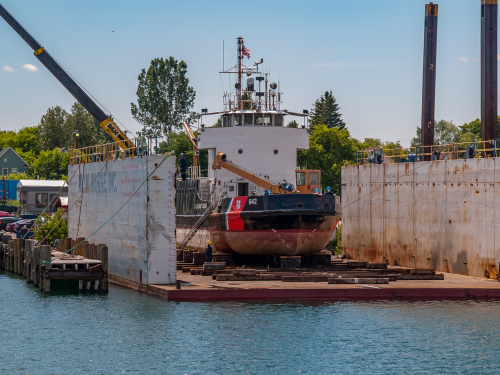
A new report from the U.S. Government Accountability Office (GAO) has reinforced bipartisan concerns from the Transportation and Infrastructure Committee leaders regarding the U.S. Coast Guard’s $12 billion shipbuilding contract.
The GAO studied the Offshore Patrol Cutter contracts at the request of U.S. Reps. Peter DeFazio (D-OR), the Chair of the House Committee on Transportation and Infrastructure; Sam Graves (R-MO), the ranking member of the committee; Sean Patrick Maloney (D-NY), chair of the House Subcommittee on Coast Guard and Maritime Transportation; and Bob Gibbs (R-OH), that subcommittee’s ranking member.
The report highlights concerns about the cutter’s design process, deficiencies in the construction schedule, and the potential for program delays and cost increases under the contract awarded by the Coast Guard and the Department of Homeland Security.
“Our Committee is committed to helping the U.S. Coast Guard fulfill its critical missions, and that means we must raise hard questions when the numbers don’t add up. This kind of congressional oversight is key not only to the success of the OPC acquisition program but also to the integrity of the entire multi-decade $29 billion enterprise to recapitalize the Coast Guard’s fleets of offshore cutters— the single largest acquisition in the Service’s 230-year history,” said DeFazio. “I appreciate the GAO for providing its thorough analysis of the issue and expect leaders of both the Coast Guard and DHS to provide the Committee with a better understanding of how they plan to get this process back on track, ensure mission readiness, and protect the interests of U.S. taxpayers.”
In 2018, the USCG began replacing its fleet of Medium Endurance Cutters with 25 new Offshore Patrol Cutters, the first of which is now under construction. Unfortunately, within a month of signing the contract, the contracted shipyard and most of the area around it was damaged by Hurricane Michael.
In order to get the first replacement cutters built, the USCG and DHS provided the shipyard with relief from having to meet some of its contract terms. On Nov. 25, 2019, Transportation Committee leaders asked the Acting DHS Secretary to justify this decision.
“This multi-billion dollar cutter replacement program is absolutely vital to ensuring the Coast Guard can adequately carry out its critical national security missions, such as drug and migrant interdiction and maritime border protection,” said Graves. “GAO concerns about the OPC design process and procurement, the initial capability of the winning bidder to fulfill the contract, and DHS’s decision to provide extraordinary relief to the shipbuilder to carry out the original contract underscore bipartisan Committee concerns. It is my hope that the Coast Guard learns from these mistakes as the construction and recompete processes move forward. They must also work constructively with the Committee to address the mission gap caused by these delays. The Committee stands united in helping the Service achieve these shared goals.”
The updated plan is to recompete the program after producing the fourth cutter and step up production to two replacement cutters per year.